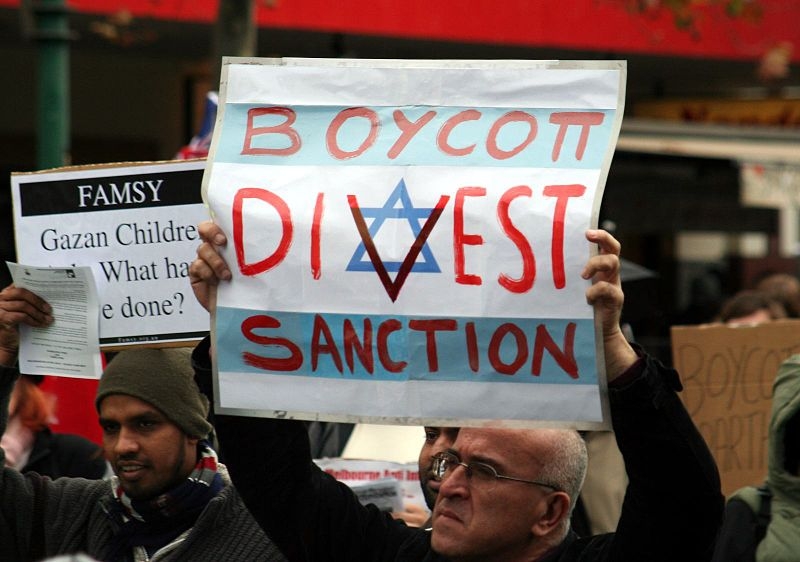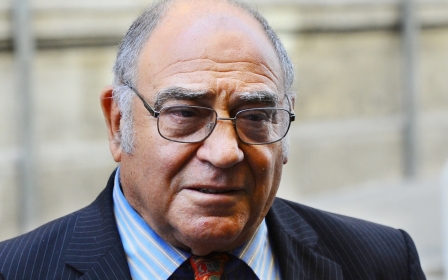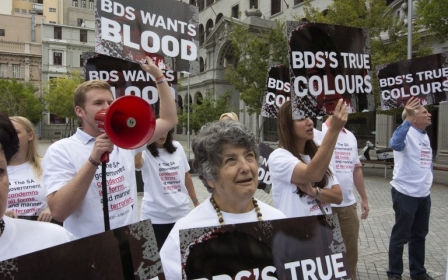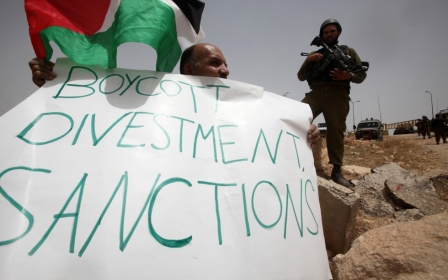Are sanctions Israel’s new enemy?

For more than a week now, Israelis are feeling under attack, as if a new enemy is threatening their very existence. The dangers that this new enemy poses to Israel are being voiced by Prime Minister Benjamin Netanyahu and have preoccupied the front pages of popular media. Yet this time around, the enemy is not Iran or Hezbollah or Hamas; it's the Boycott, Divestment and Sanctions (BDS) movement that is casting its shadow over Israel.
It all began a week ago with the Palestinian move to expel Israel from FIFA (Federation International de Football Association) because of an alleged violation of Palestinian footballers’ rights. The proposal was not even voted, as the president of the Palestinian association Jibril Rajub withdrew it at the last moment. Yet instead of celebrating victory and going on with its business, Israel turned its battle against boycott into its most burning issue.
Prime Minister Netanyahu referred to the boycott movement several times this week, claiming that "after they [Israel's enemies] failed to defeat us with military means, they try to use a new weapon against us - boycott". Israel's most-circulated newspaper, Yediot Ahronot - usually a staunch enemy of Netanyahu - launched a campaign against the BDS movement, dedicating its front pages to the issue.
The struggle against this stubborn but rather tiny pro-Palestinian movement even led to a rare reunion between two American Jewish billionaires - Sheldon Edeleson and Haim Saban - who are usually split in their political affiliation: Edelson sponsors Republican candidates while Saban is very close to Hillary Clinton. Yet early this week they put their disagreements aside and met in Las Vegas in order to coordinate a worldwide campaign against the BDS movement.
The new culture minister, Miri Regev, was appointed to lead an inter-ministerial body that will deal with the issue. Gilad Arden, the minister for strategic threats, set up his own team to handle the problem. These moves were in addition to an already existing team in the foreign office that was formed during the weeks preceding the vote in FIFA.
International isolation
The warnings issued this week by Israeli politicians and journalists about an insidious process of international isolation materialised on Tuesday, when the British National Union of Students (NUS) decided to join the BDS movement. True, this move is largely symbolic, as each of the many thousands of student organisations are free to choose in what way, if at all, they may join this movement. But the message that most Israelis got was clear: their country is under siege.
The question is: why does official and un-official Israel enlist to such a campaign that certainly magnifies the importance of the BDS movement and gives its leaders a feeling of satisfaction? There is certainly a political explanation for this phenomenon. The new Netanyahu government, maybe the most right-wing in Israel's recent history, needs this international threat in order to fight its own internal enemies, imagined or real.
Deputy Foreign Minister, Tzipi Hotovely - who stunned foreign diplomats last week by explaining Israel’s occupation of the West Bank as the fulfilment of a divine promise to the Jewish people - asked the Swiss government on Tuesday to cancel an exposition that the Israeli dissident organisation, Breaking the Silence was about to hold in Zurich. Portraying all opposition to the government policy as a cooperation with outside enemies makes it easier to fight them from within.
Pre-emptive strike
Another reason may be that Netanyahu is preparing himself for the near future. By the end of June, the agreement between Iran and the P5+1 nations - the US, UK, France, China, Russia, plus Germany - concerning its nuclear programme is predicted to be signed. The assumption is that the day after the signing of the agreement, the Israeli-Palestinian conflict will again be on the agenda.
France is also supposed to renew its initiative to bring about a UN Security Council resolution calling for a creation of an independent Palestinian state within two years' time. In an interview screened yesterday on Israel's Channel 2, American President Barack Obama hinted clearly that his administration will not necessarily defend Israel from such initiatives, as Netanyahu cannot convince the world that he is committed to a two-state solution.
Netanyahu may think that a concerted attack on the initiators and supporters of the boycott movement, labelling such acts as “anti-semitic”, may serve as a pre-emptive strike against future pressure on Israel on the Palestinian issue. Netanyahu used similar tactics in order to enlist the US and the international community for sanctions against Iran. It worked quite well in pressuring the regime in Tehran.
Israel may also be afraid that what starts with a student union in Britain may morph into a wider boycott movement. It is not probable that it will include western governments in the near future, as was the case with apartheid South Africa, but workers’ unions, pension funds and similar civil society organisations from Europe or even the US may join in. Israel is largely dependent on foreign trade and even mild sanctions could cause it harm.
But, whatever the reasons for the semi-hysteria that the BDS movement has generated within Israel, one effect has already been achieved. Even conservative Israelis, who usually do not see any urgency to reach an agreement with the Palestinians, call upon the government to enter into some sort of dialogue with them in order to relieve the pressure from Israel and show the international community that progress is being made.
Danny Ayalon, Israel’s ex-deputy foreign minister under Avigdor Lieberman, went as far as saying today on Channel 2 that “Israel needs a peace process and needs to show compassion towards the Palestinians in the West Bank and in Gaza." Such talk would have earned him the title of leftist just a few months ago. Thanks to the campaign against the BDS movement, Israel is rediscovering the Palestinian issue, rediscovering the checkpoints and even the occupation. It is interesting to see where this revelation will lead.
- Meron Rapoport is an Israeli journalist and writer, winner of the Napoli International Prize for Journalism for an inquiry about the stealing of olive trees from their Palestinian owners. He is ex-head of the News Department in Haaertz, and now an independent journalist.
The views expressed in this article belong to the author and do not necessarily reflect the editorial policy of Middle East Eye.
Photo: Anti-Israel Protestors (WikiMedia Commons).
New MEE newsletter: Jerusalem Dispatch
Sign up to get the latest insights and analysis on Israel-Palestine, alongside Turkey Unpacked and other MEE newsletters
Middle East Eye delivers independent and unrivalled coverage and analysis of the Middle East, North Africa and beyond. To learn more about republishing this content and the associated fees, please fill out this form. More about MEE can be found here.





